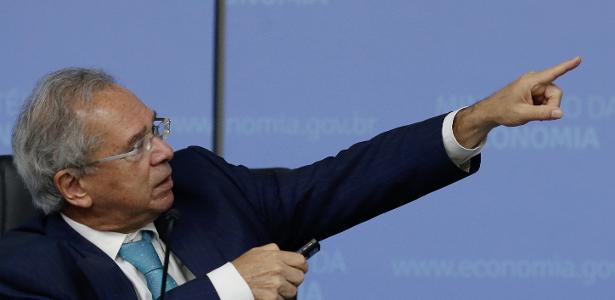The Economy Ministry will defend a position of dialogue with Russia in the discussions of the G20 (group of the 20 largest economies in the world), the IMF (International Monetary Fund) and the World Bank. The stance will be adopted by Minister Paulo Guedes at the meetings of the three organizations that will take place next week in Washington, United States. Guedes embarks there on Sunday (17).
Russia has suffered sanctions from several countries after invading Ukraine and starting a war in the country.
In a letter to Guedes this week, the country asked Brazil for help to avoid political accusations and alleged attempts at discrimination in multilateral organizations. The letter arrived just under a week before the meetings of the G20, the IMF and the World Bank.
According to the Economics Ministry’s Secretary for International Economic Affairs, Erivaldo Gomes, there is a consensus within the ministry that the “bridges” built between countries in the economic space must not be destroyed. The view is that it would be necessary to avoid “emotional attitudes” in the present moment.
“We see the interruption of communication channels as a way for you not to discuss the problem and to seek solutions. Regardless of who it is, we want the communication channels to work,” he said.
Bolsonaro’s proximity to Russia
Since hostilities began in Eastern Europe, the Brazilian government has avoided confrontation with the Moscow government. President Jair Bolsonaro (PL) visited Russian President Vladimir Putin in February, just before the start of the war. On the occasion, without mentioning Ukraine, Bolsonaro said he “shows solidarity with Russia.”
In Brazil, given the conflict that has already started, Bolsonaro defended a neutral position towards Russia. At the same time, the Itamaraty supported a resolution against Russia in the UN General Assembly (United Nations) in early March.
In a recent vote to exclude Russia from the UN Human Rights Council (HRC), Brazil chose to abstain.
The economic team will not deal with sanctions
Guedes will be in Washington between April 17 and 23 for meetings of the G20, the IMF and the World Bank. He and other members of the ministry will also meet with investors and have bilateral meetings with officials from other countries.
Even as the war between Russia and Ukraine permeates talks during this period, the business team says it will not specifically address the sanctions the United States and European countries have imposed on Russia.
The assessment is that Guedes should not deal with the matter, which would fall within the realm of international politics and fall under the responsibility of the State Department.
Brazil wants to sell itself as a “solution” for investors
In Washington, the ministry plans to discuss the problem of global transport chains and the cost of fertilizers caused by the war.
There will also be debates about the economic impact of the pandemic, energy costs and food security in the countries. At the World Bank, one of the issues will be the national debt of the countries.
Guedes will try to position Brazil as a “solution” and “safe haven” for investors. The discourse is that the country has done the “homework” of reforms and has therefore become more resilient to turbulences like the current one.
Defending Brazil as a safe haven for investment has been run by the economics team since the beginning of the war. This is to show that Brazil would be willing to receive any resource streams previously invested in other regions, including Russia.
Central bank data shows that in 2021, despite the novel coronavirus pandemic, Brazil received $46.4 billion in IDP (direct investment in the country) — investments deemed productive and in new factories or in existing businesses were made. However, the number is still below what was recorded before the pandemic: in 2019 it was $69.2 billion.
Solution also for food safety
The Economy Ministry will also defend at the Washington sessions that Brazil is the solution to the countries’ food security.
According to the ministry, the country, which is already a major food supplier to the world, could become even more important in this area during this time of global turmoil.
The war between Russia and Ukraine has pushed up prices for commodities exported by Brazil, such as soybeans and corn. In this regard, the Brazilian trade balance has benefited from higher prices.
The problem is that, on the other hand, these products are also consumed in the domestic market. This is reflected in higher prices in the supermarkets.
The latest data from IBGE (Brazilian Institute of Geography and Statistics) shows that in the 12 months to March domestic market soybean oil is up 23.75%, grain corn is up 23.36% and chicken (very price dependent). corn) was 16.11% more expensive.

